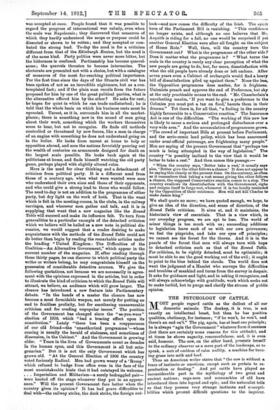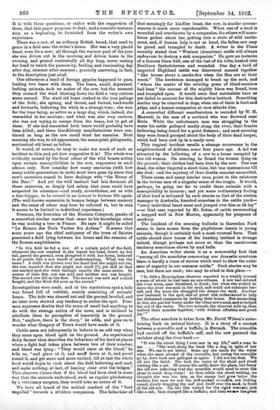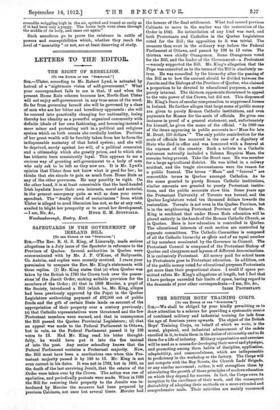THE PSYCHOLOGY OF CATTLE.
MOST people regard cattle as the dullest of all our domestic animals. The donkey, it is true, is not exactly an intellectual beast, but then he has positive qualities, obstinacy, for instance ; "if he won't, he won't, and there's an end on't." The pig, again, has at least one principle; he is always "agin the Government" whatever form it assumes (but there are certainly some reasons for this attitude), and at times he shows sagacity, resourcefulness, and, it is even said, humour. The cow, on the other hand, presents herself to the ordinary observer as a mere part of the Landscape, so to speak, a sort of emblem of calm nullity, a machine for turn- ing grass into milk and beef. Thus an American writer states that "the cow is without a trace of instincts or emotions, except such as pertain to re- production or feeding." And yet cattle have played no
inconsiderable part in the mythology of two great and ancient nations ; saga-men and seannachies of old have introduced them into legend and epic; and the naturalist tells us that they possess very strange instincts and suscepti- bilities which present difficult questions to the inquirer. It is with these questions, or rather with the suggestion of them, that this paper proposes to deal; and a concrete instance may, as a beginning, be furnished from the writer's own experience.
There was a cow, of an ordinary British breed, that used to graze in a field near the writer's house. She was a very placid beast, even for a cow ; all through the warmer part of the year she was driven out in the morning and driven home in the evening, and grazed contentedly all day long, never raising her head to watch the passers-by, feeding and ruminating day after day, summer after summer; precisely answering, in fact, to the description just cited.
One afternoon a band of foreign gypsies happened to pass, leading two bears with them. The bears, small, depressed-
looking animals, took no notice of the cow, but the moment they crossed the wind blowing down the field a very curious
scene ensued. The staid old beast rushed to the iron palings
of the field ; she sprang, and thrust, and turned, backwards and forwards, bellowing the while in a strange tone ; she was, for the time being, as active as a large dog, which, indeed, she resembled in her motions ; and what was also very curious, she was not trying to escape from the bears, but to get at them. If she had succeeded both bears would probably have been killed; and these bloodthirsty manifestations were con- tinued as long as the cow could wind her enemies. Next
morning she was, to all appearance, the same quiet, plilegmatic, mechanical old beast as before.
It would, of course, be easy to make too much of such an incident as this, and yet how suggestive it is ! The whole was evidently caused by the feral odour of the wild beasts acting upon certain susceptibilities in the cow, responsive to such odours only. Now consider how many centuries (with how many cattle-generations in each) must have gone by since this cow's ancestors ceased to have dealings with "the House of the Bear." And yet the wild instinct had lain dormant all those centuries, so deeply laid asleep that none could have suspected its existence—and ready, nevertheless, set as with a hair-trigger, to be roused in an instant to furious life again. (The well-known connexion in human beings between memory and the sense of odour may here be referred to, but in man it seems to be limited to individual experience.)
Freeman, the historian of the Norman Conquest, speaks of a somewhat similar matter that came to his knowledge when be was making a tour in France. He says it might be called
"Le Roman des Trois Vaches des Arenes." It seems that some years ago the chief antiquary of the town of Saintes possessed a field lying between his house and the remains of the Roman amphitheatre.
"In this field he fed a cow. At a certain point of the field, whenever the cow reached it, she tossed her head, threw up her tail, pawed the ground, even ploughed it with her horns, behaved in all points like a cow bereft of understanding. What was the cause ? A cloth was thrown over her head that she might not see, she was muzzled that she might not smell (?), yet still at that one marked spot she went through exactly the same antics. In course of time this cow was sold and another cow was bought. The second cow did as the first. The second was sold and a third bought, and the third did even as the second."
Investigations were made, and at the mysterious spot a hole was found full of rubbish, mainly consisting of animals' bones. The hole was cleared out and the ground levelled, and
no later cows showed any tendency to notice the spot. Free- man expresses doubts that the sense of smell had anything to
do with the strange antics of the cows, and is inclined to attribute them to perception of insecurity in the ground. But, "anyhow, there is the story," he adds, and goes on to wonder what Gregory of Tours would have made of it.
Cattle seem not infrequently to behave in an odd way when they come upon blood spilt on the ground. An experienced dairy farmer thus describes the behaviour of his herd at places where a fight bad taken place between two of their number,
and blood was lying : "They would stare at the blood," be tells us, "and glare at it, and snuff down at it, and prowl round it, and get more and more excited, till at last the whole herd would begin to rush about the field 'bellowing and mad, and make nothing, at last, of leaping clear over the hedges."
This observer claims that if the blood had been shed in some way that the animals understood, such as regular phlebotomy by a veterinary surgeon, they would take no notice of it.
We have all heard of the unkind conduct of the "hart =galled" towards a stricken companion. The behaviour of that seemingly far kindlier beast, the cow, in similar circum- stances is much more reprehensible. When one of a herd is wounded and overthrown by a companion, the others will some- times gather about her, getting into a state of wild excite- ment, and, if human help is not at hand, the fallen cow may
be gored and trampled to death. A writer in the Times recently stated that "Western (American) cattle will always endeavour to destroy a sick companion." He gave an instance of a famous bison bull, one of the last of his tribe, hunted into Southern Saskatchewan and wounded. One day a herd of imported Highland cattle was discovered massed together
"like horses about a smoke-fire when the ffies are at their
worst." The herdsmen managed to break up the mob, and "where the centre of the swirling press of blood-maniacs had been" the carcase of the mighty bison was found, torn and trampled upon. It would seem that naturalists have as yet failed to account for this destructive instinct. Something
similar may be observed in dogs, when one of them is hurt anl yelps, and a kennel-companion at once attacks him.
A somewhat different manifestation is recorded by W. H.
Maxwell, in the case of a cowherd who was drowned near Erris. While the unfortunate man was struggling in the water his cattle galloped madly along the river, their frantic bellowing being heard for a great distance; and next morning they were found grouped about the body of their dead keeper, which had been cast up in a sandy cove.
This tragical incident recalls a strange occurrence in the neighbourhood of Athlone, some four years ago. A. lad was attracted by the bellowing of a cow to a house occupied by
two old women. On entering he found the women lying on the ground ; their clothes had been torn by the cow. One was dead, the other lingered a short time, but was unconscious till she died : and the mystery of their deaths remains unravelled.
These cases, and many similar ones, point to the existence in the bovine race of a singular sense of the tragic. It would, perhaps, be going too far to credit these animals with a susceptibility to humour; and yet some rudimentary feeling
of that kind is indicated by such stories as that of the station manager in Australia, knocked senseless in the cattle yard—
"every individual beast came and jumped over him as IA lay" —or that case reported by Mr. Beton, of cattle surrounding a trapped wolf in New Mexico, apparently for purposes of mockery.
The incident of the coursing bullocks in Garendon Park seems to have arisen from the playfulness innate in young animals, though it certainly took a most unusual form. That cattle should show traces of the hunting instinct is strange indeed, though perhaps not more so than the carnivorous tendency sometimes shown by mad bulls.
An American writer states it as a noteworthy fact that
"among all the anecdotes concerning our domestic creatures there is hardly a trace of stories which tend to show the exist- ence of sagacity in our common cattle." Such stories may be rare, but there are such ; two may be cited in this place :— " In 1904 a Birmingham observer reported to a -weekly journal a scene of which he had been an eye-witness. A cow had entered the river Avon, near Stratford, to drink; but when she wished to leave the river she sank in the mud, and could not extricate her= self, and the more she struggled the deeper she sank. Another cow hastened to the spot, and at great risk endeavenred to help her distressed companion by locking their horns. Not succeeding in this, she put her horns under the other cow's neck, and so helped her out of the water. The two animals, the observer tells ms, then rubbed their muzzles together, with evident affection and great joy.'"
The other anecdote is taken from Mr. David Wilson's enter- taining book on natural history. It is a story of a contest between a crocodile and a buffalo, in Burmah. The crocodile had carried off the buffalo's calf, and the cow pursued the ravisher along the river-bank
"It was the nicest thing I ever saw in my life," said a man to me. . . . "She went along the bank like a dog, in spite of her size. We ran to see better. Some say she made for the water when she came abreast of the crocodile, but seeing the crocodile go by, drew back and galloped on again. I did not see that. We all saw the finish. She took the water at the shoal and stood waiting like a cat. Of course the cattle knew the place, but fancy the old cow reflecting that the crocodile would need to cross the shoal to reach deep water ! At first, while she stood waiting, we thought she was too late, as the enemy had gone below the surface, but soon we saw the stiff-necked crocodile, not looking round, slowly dragging the calf and itself over the sant, in front of the old cow. Ha, ha! She waited for the right mement, just like a cat; then charged like a buffalo; and then we sem the great crocodile wriggling high in the air, spitted and tossed as easily as if it had been only a puppy. The horns both went clean through the middle of its body, and came out again."
Such anecdotes go to prove the existence in cattle of powers and susceptibilities which, whether they reach the level of "mentality" or not, are at least deserving of study.








































 Previous page
Previous page